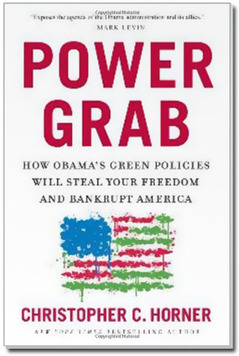 It’s been a year and a half since President Obama took office and there are definitely mixed emotions on how effective he has or hasn’t been. One area where many people have been critical is with regards to his green policies. One such critic is Christopher Horner, who has written a book with the central theme that Obama’s green polices are the worst thing that has happened to our country over the past two years. Power Grab, How Obama’s Green Policies Will Steal Your Freedom and Bankrupt America, has two major tenets: that climate change is a farce, and that the green policies and programs that are being developed to curb climate change will ruin our lives and our country.
It’s been a year and a half since President Obama took office and there are definitely mixed emotions on how effective he has or hasn’t been. One area where many people have been critical is with regards to his green policies. One such critic is Christopher Horner, who has written a book with the central theme that Obama’s green polices are the worst thing that has happened to our country over the past two years. Power Grab, How Obama’s Green Policies Will Steal Your Freedom and Bankrupt America, has two major tenets: that climate change is a farce, and that the green policies and programs that are being developed to curb climate change will ruin our lives and our country.
The mood is set at the beginning of the book where Horner lays out what America will be like in 2015, when Obama’s policies begin to take affect. He lays out a country with energy shortages, food shortages and job shortages. He describes a world in which the rise of renewable energy and cap-and-trade sent our jobs oversees, and while America’s wealth is declining, the cost of living is rising.
Horner purports that any it would be one thing if the proposed green measures actually curbed global warming, but, he says, they don’t. He writes, “As I explained in Red, Hot, Lies, no proposal ever tabled would, according to anyone, detectably impact global temperature…” He goes on to say, “The real issue Americans should be concerned with is the outcome of these “green”schemes: the transfer of your liberties and wealth to the state, and the transfer of jobs to other countries.”
While I disagreed with the majority of Horner’s thesis, there were a few things I did agree with. Our country is in fact losing “green” jobs oversees. The majority of solar and wind manufacturing is taking place in Europe and Asia. I also agreed with his assessment of environmentalists. “The truth is the greens have fought “renewable” plants as aggressively as they have conventional sources that work.” He then supports this statement with a list of energy projects they have blocked from renewables, to coal, to nuclear and natural gas.
Horner is quite harsh in his portrayal of many key climate policy leaders including Cathy Zoi, Carol Browner and Van Jones. He is also unforgiving in his picture of climate and energy policies (he supports the status quo and disagrees that we’ve seen, or will soon be faced with peak oil). Rather than debate the policies and decisions, he attacked them, which I don’t believe is a constructive way to keep the dialogue open.
So if you are general supporter of green initiatives and don’t have much time to read, then keep this book off your reading list. However, if you are as passionate about Horner that Obama spells our country’s demise and don’t mind a one-sided argument, then this book may be for you.

